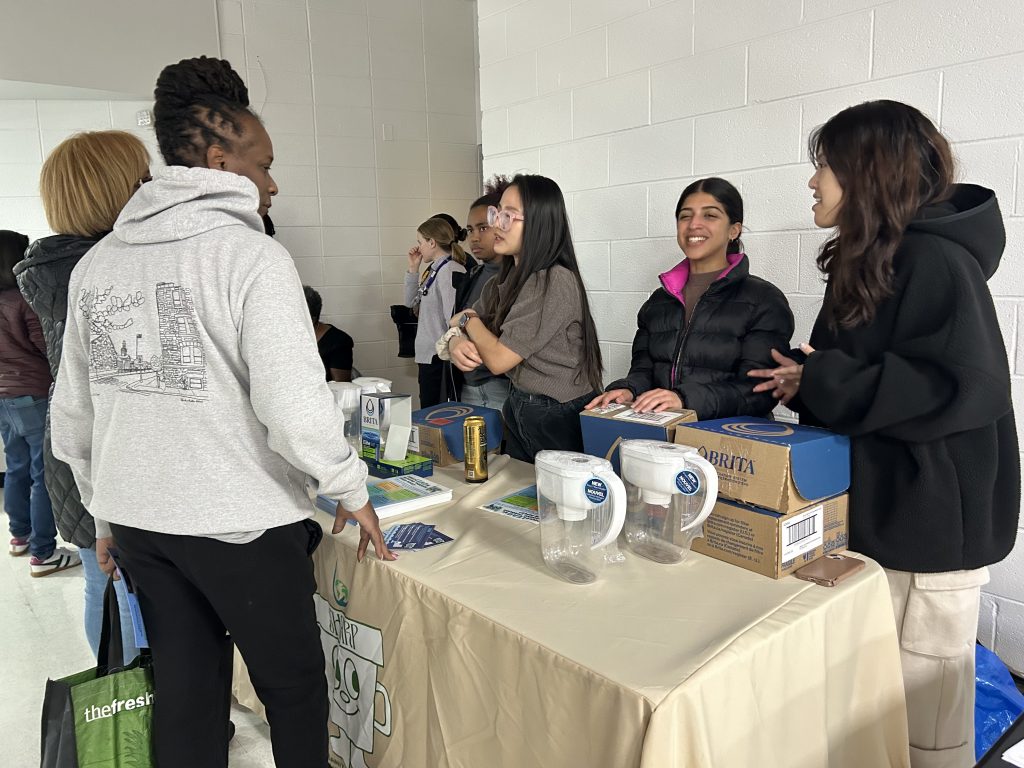
During a recent community dinner at the Dornsife Center for Neighborhood Partnerships on Nov. 12, Drexel University’s Sanitation Health Aid Relief Project had the chance to raise awareness about a critical environmental health issue: lead contamination in drinking water. The event brought together residents of West Philadelphia, and SHARP worked to provide them with the necessary resources to address the risks of lead exposure.
A distinct feature of the community dinner was the number of resources being offered to residents; there were tables providing services and information on several important topics.
Brooke Law, a senior data science major and SHARP’s Event Coordinator shed light on her experience tabling: “It was cool to see how many people attended. As it turned out, a lot of community members were aware of lead in the water, so the conversations centered around how long they had lived in the community and their desire to address the issue.”
SHARP’s table was more than an educational space — it was an interactive one.
Because so many residents had previous knowledge of the risks of lead contamination in their water, SHARP focused on providing them with the concrete resources to make a change, “like the number to call the Philly water department to get your water tested for lead,” stated Law.
The organization also gave out Brita water filters for residents who need them to reduce the amount of contaminants in their drinking water. This hands-on approach allowed them to take first-hand control of their health and well-being.
SHARP’s efforts were funded by the Anti-Racist Civic Engagement Mini-Grant from the Lindy Center for Civic Engagement, which enabled them to expand their outreach with educational materials. The organization also partnered with Toxic Free Philly, a local group dedicated to reducing environmental toxins in Philadelphia communities, ensuring that SHARP’s resources were targeted toward the specific needs of West Philadelphia residents.
Before the event, SHARP conducted research to ensure that the issue of lead contamination was a relevant concern for West Philadelphia residents. Many houses in the area are older, which increases the likelihood of lead pipes still being in use. This knowledge helped guide the tabling materials, which included concise flyers and magnets designed to convey essential information without overwhelming residents with text. The use of larger fonts was also a deliberate decision to make the materials more accessible to a broader audience.
According to their grant proposal, SHARP’s aims were to “communicate the risks of lead in water, symptoms of lead exposure and resources for further assistance if lead is suspected to be in drinking water.”
For Law, the motivation to participate in the event stemmed from a deep-seated belief in the importance of sanitation and access to clean water.
“That’s what drove my participation,” she shared. “I never like to pass up an opportunity to engage with the community.”
The tabling event was a success not just because of the information shared but because it allowed residents to feel supported and connected. SHARP members are hopeful that future events will continue to expand on this model, reaching even more residents who may not yet be aware of the risks of lead contamination. The group plans to host additional tabling events to continue educating, providing resources and empowering community members to take charge of their health.
SHARP has made a tangible impact on the West Philadelphia community by offering both knowledge and the tools necessary to take action. Students who want to attend future events can stay connected through their Instagram account, @drexel.sharp, and through the Dornsife Center @dornsifecenter.


